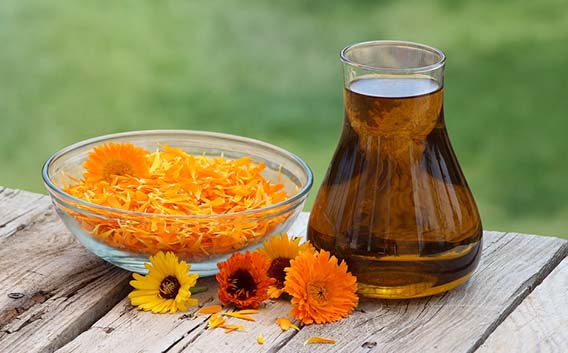The marigold, a plant of the Compositae family characterized by yellow-orange flowers, has been known since Roman times for its properties. It is a natural remedy suitable for many situations, so let's discover the properties, uses and contraindications of calendula.
La calendula, a plant of the Compositae family with characteristic yellow-orange flowers, has been known since Roman times for its properties. It is a natural remedy suitable for many situations, let's find out then properties, uses and contraindications of the calendula.
In our natural pharmacy to always keep at home, calendula can certainly not be missing, whether in the form of dried flowers with which to make an infusion, mother tincture or ointment. It is in fact a versatile remedy, also suitable for children, especially useful in case of skin problems (external use) but also to improve digestion, reduce pain related to the menstrual cycle (internal use) and much more.
Read also: CALENDULA MOTHER TINT: PROPERTIES, USES AND WHERE TO FIND IT
Index
CALENDULA: PROPERTY
La Calendula officinalis it is a plant rich in properties, it boasts in fact anti-inflammatory, soothing and healing qualities, for this reason it is considered one of the natural remedies of excellence to be used for all skin problems: insect bites, burns, small wounds, cracks, inflammation, erythema, chilblains, etc. Among other things, it is useful in case of itching, to decongest the skin but also to reduce edema and swelling.
Another interesting property of the marigold is that of being a natural antiseptic, therefore it disinfects and keeps bacteria, viruses and other microorganisms away. All the benefits that this plant offers, which can be used internally (in the form of mother tincture, infusion and extract or external in ointment and oleolite) are due to the presence of specific essential oils contained in it but also of polysaccharides, flavonoids and other important active ingredients.
It is also a good one painkiller, antispasmodic and natural regulator especially in the case of a low or too abundant menstrual cycle, it acts as a stimulus for the work of the liver and promotes the flow of bile. Finally, calendula has digestive qualities, an herbal tea made from dried flowers of this plant can be useful after a heavy meal and thanks to the presence of mucilage it is also excellent for soothing any inflammation of the mucous membranes.

The main properties of the calendula are therefore:
- Anti-inflammatory
- Soothing and decongestant
- Cicatrizing
- Antiseptic
- Pain reliever
- Antispasmodica
- It stimulates the liver
USES OF THE CALENDULA
For all problems related to the skin, the calendula cream or calendula oleolite, there are various formulations on the market with more or less active ingredients that can be applied to the affected area several times a day. In some circumstances, compresses to be made with marigold mother tincture diluted in water or with a decoction based on dried flowers may also be useful.
Read also: CALENDULA: THE YELLOW-ORANGE FLOWER ALLYED TO THE SKIN AND MORE
For internal use it is used successfully for regulate the menstrual cycle, to stimulate the liver but also in case of colitis, ulcers or gastritis as the mucilages play asoothing and regenerating action on the mucous membranes. Excellent for example for the oral mucosa: in case of canker sores, gingivitis or various inflammations, rinsing can be done using diluted calendula mother tincture.
The calendula cream but also the oleolite are useful for small children, for example in the case of diaper rash or for other irritations of their delicate skin. Mothers, on the other hand, can use it to carry out vaginal douches (here you will find a recipe) but also as an intimate cleanser, also ideal after childbirth.
 As you will have understood, this plant can be useful for various problems. Summing up:
As you will have understood, this plant can be useful for various problems. Summing up:
- Insect bites
- Chapped skin
- Scars
- calli
- Geloni
- Sunburn
- Acne
- Small wounds
- Erythema
- Gingivitis
- Aphthae
- Inflammations of various kinds
- Poor or too heavy menstrual cycle
- Colitis
- Liver problems
- Slow digestion
- Diaper rash
CONTRAINDICATIONS OF THE CALENDULA
If you are using calendula for the first time, it is good to first do a small test on a small area of the body in order to be sure not to find allergic reactions. This plant, in fact, may not be well tolerated by those suffering from ragweed allergy or other plants of the Compositae family. It is not recommended to use calendula internally during pregnancy and breastfeeding.


























